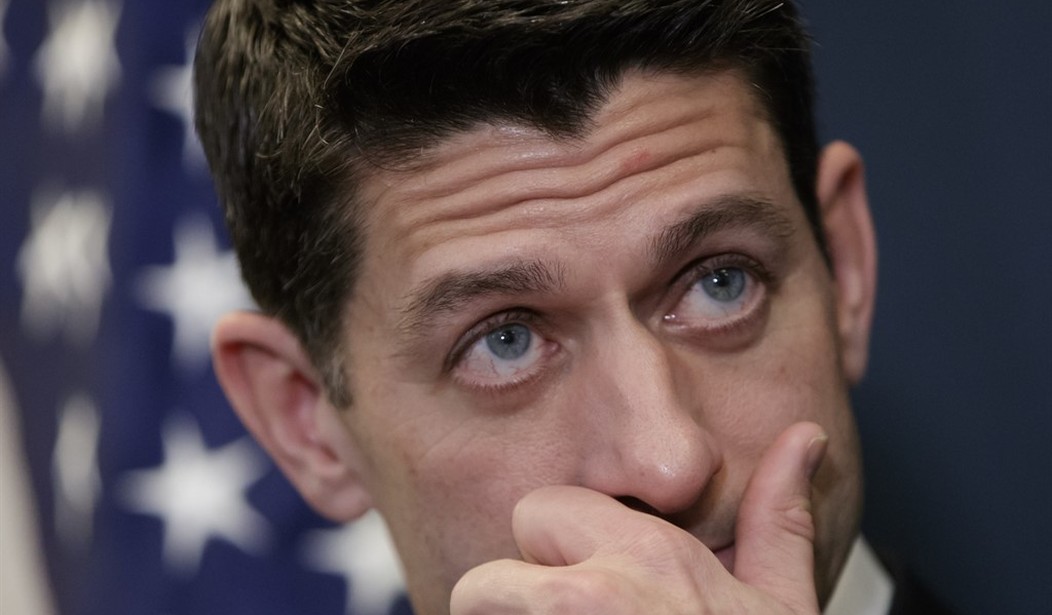UPDATE - Here we go. The conventional wisdom is that they wouldn't call the vote if they didn't have the whip count where it needs to be. I'll believe it when I see it, but it looks like this is happening. Despite its bad misfires on key Obamacare projections, the CBO isn't getting a crack at scoring this bill before the planned vote -- a precedent that I don't like. But after herding cats for weeks, GOP leadership has apparently decided to strike while the iron is hot and the votes are allegedly in place. Stay tuned for a big Thursday on Capitol Hill:
House to vote on health care bill TOMORROW - McCarthy tells reporters they have the votes.
— Ben Siegel (@benyc) May 3, 2017
Yesterday, we mentioned the "no" stance adopted by Rep. Fred Upton as a potentially ominous sign for the chances of House Republicans managing to pass the American Health Care Act, which would repeal and replace much of Obamacare. We also highlighted Rep. Billy Long from Missouri, whose daughter has been battling cancer, coming out against the existing bill. Those two defections -- from a former chairman of a relevant committee, and a generally pro-leadership rank-and-file member, respectively -- indicated that the prospects for passage were dimming. But Cortney wrote earlier about an amendment offered by Upton today, which leadership has reportedly embraced. The tweak would add an additional $8 billion into a patient stabilization fund to help cover costs for a narrow band of consumers who: (a) have costly pre-existing conditions, (b) live in states that would seek and obtain a "community rating" waiver, and (c) have not obtained and maintained coverage prior to a new law going into effect. All others would be far less affected by the bill's provision allowing for optional state-by-state flexibility on certain mandates. With this change to the legislation getting a thumbs-up, both Upton and Long now say they're on board to vote 'yes:'
Recommended
"I support the bill with this amendment" Upton tells reporters at the White House
— Erica Werner (@ericawerner) May 3, 2017
.@USRepLong is now a YES on the AHCA with the new amendment
— Phil Mattingly (@Phil_Mattingly) May 3, 2017
Upton believes his post-amendment reversal means it's "likely" that this first iteration of the AHCA will pass the lower chamber. House leadership is still whipping members and counting heads, with a possible eye toward a floor vote later this week (tomorrow?), according to the Washington Post:
It remained unclear Wednesday morning whether the Upton amendment would buy enough votes for the American Health Care Act, as the Republican proposal is called. The White House has been putting heavy pressure on House Speaker Paul D. Ryan (R-Wis.) to get it passed quickly, amid fears that Republicans will lose their window of opportunity if the effort continues to drag out. The Upton change would be the latest bandage Republicans have affixed to their measure as they’ve tried to keep it viable. Last month, they added $15 billion for a program to reimburse insurers who cover patients with preexisting conditions — an effort to appease conservatives worried about lowering premiums...Republicans left their weekly conference meeting Tuesday with no health-care vote on the schedule. The House is slated for recess Thursday until May 16. But on Wednesday morning, White House budget director Mick Mulvaney said a vote is now possible as soon as Saturday. A Washington Post analysis shows 20 House Republicans either opposed to or leaning against the bill, and 29 more either undecided or unclear in their positions. If no Democrats support the bill, the Republicans can lose no more than 22 GOP votes to pass it in the House.
In other potentially positive signs for President Trump and Speaker Ryan, the conservative Club for Growth has backed the updated bill, Heritage Action is no longer "scoring" against it as a "key vote," and the editors of National Review have come out in support of passing the measure:
House Republicans should vote for the latest version of the health-care bill. We say so even though we have criticized previous versions and the process that led to this one, and even though we still have serious reservations. We say it because the bill has moved in the right direction, and because in our judgment passage through the House now considerably raises the likelihood that we will see improvements in health policy this year. The bill as it stands would abolish Obamacare’s fines on people without health insurance, reduce taxes and spending, reform Medicaid by moving it closer to federalist principles, and open the door to deregulation in states that choose to pursue it. It would thus move us closer to a system in which people would be able to buy renewable catastrophic coverage, and without subjecting such policies to disadvantages compared with other types of insurance...[Republicans] are going to continue to face conflicting pressures from different groups of voters for years to come. They need to find a way to pull the health-care system back from the centralizing path on which Obamacare put it. At the moment, House passage of this bill looks like the most plausible way.
NR's editorial board, following in the footsteps of Avik Roy's analysis, suggests that even if this bill passes, it will be incumbent upon the Senate to make needed changes on several fronts -- some of which may be previewed here. Elsewhere, the Left is arguing against the AHCA in full throat. Here's one of President Obama's most infamous spinmeisters, who bragged about misleading journalists and the public while creating an "echo chamber" in support of the previous administration's policies, complaining that Paul Ryan is "lying" to the American people. How very rich:
This is a lie. It's embarrassing that our political leaders lie with this kind of impunity in 2017. https://t.co/4me3l8iojT
— Ben Rhodes (@brhodes) May 3, 2017
One can make an argument that the GOP bill might not offer sufficiently generous protections to a limited number of people with pre-existing conditions living in specific states, but Ryan's assessment is far from a lie. For reference, a bona fide healthcare lie might entail, say, telling millions of people that they could keep their plans and doctors when you knew that wasn't true. Or asserting that everybody's rates would go down. No matter what form it ultimately takes, the Republican plan will necessarily have trade-offs, with an overarching goal of enhancing consumers' array of coverage options, including more affordable plans. The reductions in choice and the spike in costs are two glaring and enduring failures of Obamacare, affecting millions. Democrats sold their failing law as a no-lose proposition under which everyone would benefit. This was deeply dishonest and unrealistic. Republicans must not fall into the same trap, even while working to minimize disruptions for vulnerable populations. Meanwhile, there's this news out of Iowa:
BREAKING: Medica, the last carrier selling individual health policies in most of Iowa, says it likely will pull out. https://t.co/OvZI00352D
— Tony Leys (@tonyleys) May 3, 2017
Obamacare is failing, and developments like this underscore the mounting troubles that lie ahead. Democrats oppose changing the wheezing, promise-shattering status quo that they've engineered...unless the changes involve ever more government spending, taxation, micromanagement and coercion. Republicans are making a good-faith effort to clean up the mess Democrats have left them. Keeping the legislative process moving by advancing the first version of a solution is an essential first step to achieving that goal. I'll leave you with this concern from libertarian-leaning healthcare wonk Peter Suderman, who worries that the Upton amendment could deepen Obamacare's "adverse selection" problem:
That would mean even fewer people maintain coverage. Which would make insurance pools sicker and more expensive.
— Peter Suderman (@petersuderman) May 3, 2017
We've been writing about this issue for some time. If Obamacare's hated and largely ineffective individual mandate tax is repealed, and a one-time 30 percent surcharge for signing up without existing coverage is substituted in, why would people pay for more expensive coverage before getting sick or hurt? Insurers would still have to offer them a plan either way, and the only "penalty" for free riding would be a 30 percent surcharge in year one (which goes away in year two). If, as some reports indicate, the new Upton-infused money is earmarked to help consumers in "waiver states" cover this surcharge, wouldn't that diminish responsible incentives even further? Senior House Republican sources have told me that major carriers assured them that the ACHA surcharge mechanism would be sufficient for them to offer a wider menu of plans across a wider risk pool, some of which will be cheaper than current options. Lawmakers, perhaps in the Senate, need to drill down on this point, which could be a make-or-break factor in the success or failure of a new law. Oh, and by the way, it looks like House Republicans might vote on their legislation without a new CBO score, which isn't a great precedent on such a consequential bill.

























Join the conversation as a VIP Member